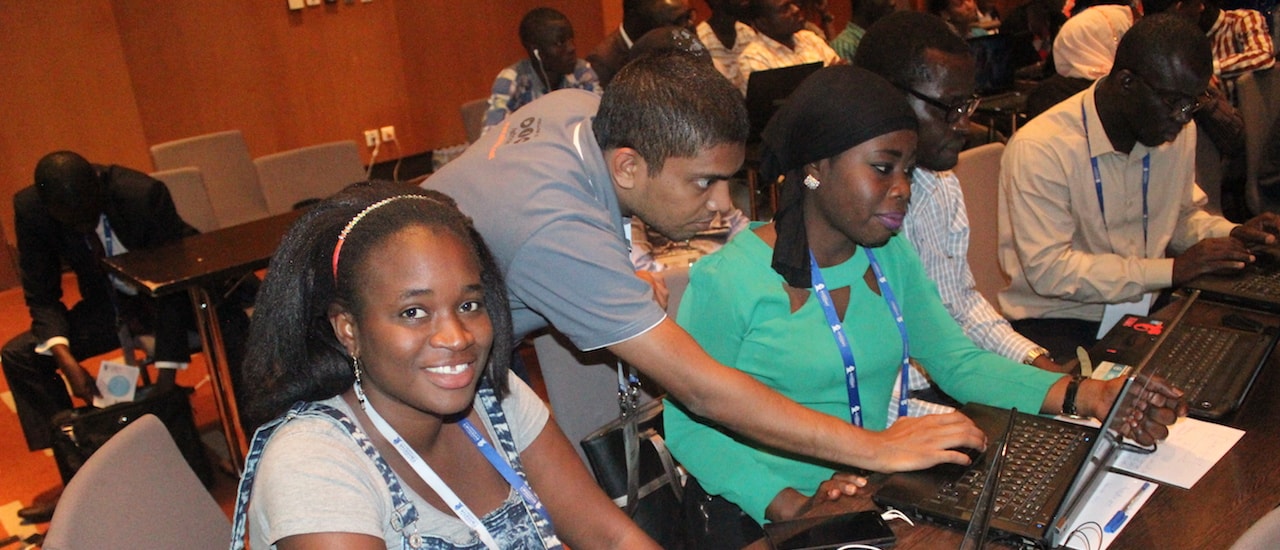The annual Hackathon@AIS, in its second year, is aimed at exposing engineers from the Africa region to open Internet Standards Development. This year, the event was held 9-10 May 2018 in Dakar Senegal at the Radisson Blu Hotel during the Africa Internet Summit (AIS-2018).
The event was attended by more than 75 engineers from 15 countries including 11 fellows who were supported to attend the event. The event featured participants with English and or French-speaking backgrounds encouraging collaboration to work. Organized into 3 tracks, the event allowed participants to choose which track they were interested in participating in. The tracks were as follows:
1. Network Time Protocol Track
Objectives:
- Make NTP more secure (Privacy)
- Using WireShark NTP Plugin to read/analyze NTP traffic
- Code changes to NTP implementations to make them compliant with the draft
- Read and understand Draft RFC
Facilitators:
- Loganaden Velvindron (Mauritius)
- Nitin Mutkawoa (Mauritius)
- Serge-Parfait Goma (Congo)
Participants were introduced to NTP and asked to test out an IETF draft and implement it in open source NTP clients.
Outcome:
Participants were able to successfully implement draft and made presentations demonstrating their work and accomplishments.
2. Network Programmability
Objectives:
- Introduce participants to Software Defined Networking (SDN)
- Introduce network programmability, including YANG, NETCONF, and RESTCONF
- Interact programmatically with OpenDaylight and Cisco IOS XE devices
Facilitators:
- Charles Eckel (United States)
- Khoudia Gueye (Senegal)
Participants were introduced to the concepts of network programmability and organized into small teams, working together through a series of online learning labs available through Cisco DevNet. They used tools such as Postman, programming languages such as Python, and network and device level YANG models via NETCONF and RESTCONF to interact with Cisco IOS XE devices and OpenDaylight.
Outcome:
Multiple teams presented what they learned and illustrated their knowledge of network programmability with live demos of OpenDaylight controlling networks created using Mininet.
3. IP Wireless in Vehicular Environments (IPWave)
Objectives:
- Analyze an IETF draft
- Test an implementation of the draft using specialized wireless cards
Facilitators:
- Prof. Nabil Benamar (Morocco)
Participants got to install the wireless cards on Desktop PCs and try out the communication between two PCs analyze the traffic with Wireshark. In order for the cards to work in OCB mode, they needed to function at 5.9Ghz. After patching the kernel (Ubuntu 16.04) the cards were able to run at 5.8Ghz with some errors reported but still enough for the cards to be in OCB mode.
Outcome
The participants got to collaborate in teams to patch the Ubuntu kernel, install the cards and reported their work at the end of the event.
Prof. Nabil has also updated the IPv6 list on the outcome of the IPWave track.
The event was a success with engineers getting to work together to implement and test open Internet standards. Several NOGs indicated an interest to organize similar activities in the local communities. It was encouraging to see several women engineers actively participate in the event and present on their findings.
The materials, presentation and information on the infrastructure for event can be found here, and the photos here.
Special thanks to the facilitators who lead the event, AFRINIC for helping with the venue and logistics.
Read the testimonies of the fellows who attended the Hackathon@AIS.

